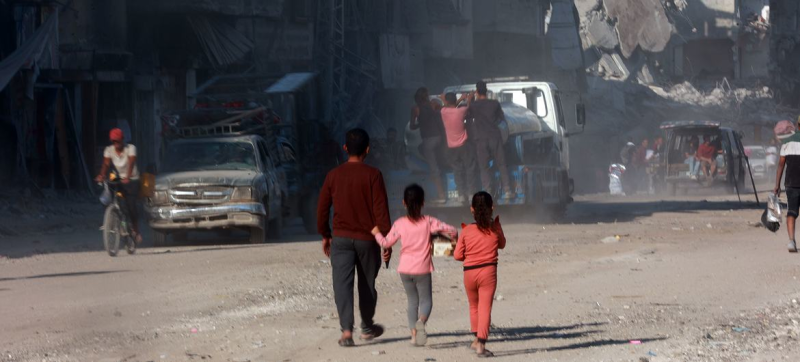- Bangladesh Bank Buys $115 Million to Support Forex Market |
- Tarique Rahman, Daughter Zaima Added to Voter List |
- NCP and LDP Join Jamaat-Led Eight-Party Alliance |
- Tarique Rahman’s gratitude to people for welcoming him on his return |
- Attorney General Md Asaduzzaman resigns to contest election |
Gaza Humanitarian Response Scaled Up Amid Ceasefire Risks

A man and two children walk through the devastated streets of Gaza.
Aid teams in Gaza are racing to meet urgent needs, with tens of thousands still displaced, sheltering in damaged buildings and makeshift sites, while reports of renewed fighting between Israeli forces and Hamas threaten to derail the ceasefire.
In a press briefing on Tuesday, UN Spokesperson Stéphane Dujarric described reports of Israeli military action as “extremely concerning,” stressing that “we don’t want civilians to be bombed again” or humanitarian operations “derailed again.”
Hamas denied involvement in a reported attack on Israeli forces by Palestinian militants earlier in the day, saying it remained committed to the ceasefire and accusing Israel of violating its terms.
Response plan continues
The UN relief coordination office, OCHA, said partners are scaling up efforts under a 60-day response plan.
“UN partners providing water and sanitation report that water distribution is expanding in northern Gaza, delivering 4,600 cubic metres daily at 585 locations across Gaza and North Gaza governorates,” Mr. Dujarric said.
Preparations for the rainy season are underway in Deir al Balah, Khan Younis, and Gaza governorates, including clearing stormwater drainage systems.
Nutrition programmes from 1 to 25 October treated more than 4,300 acutely malnourished pregnant and breastfeeding women, while preventive support reached over 134,000 mothers and children under five.
Meanwhile, Gazans continue efforts to relocate, many seeking to return to shattered homes.
“More than 480,000 movements from southern to northern Gaza have been observed since the ceasefire began, while nearly 100,500 movements from western to eastern Khan Younis have also been recorded,” Mr. Dujarric said.
“To mitigate exposure to the elements, our partners are helping displaced communities repurpose flour and rice bags – originally distributed as food aid – into sandbags to reinforce shelters against rain and wind,” he added.
Aid delays
Efforts to collect humanitarian cargo from Gaza’s crossings are ongoing.
However, aid deliveries are facing delays due to rerouting of humanitarian and commercial trucks by Israeli authorities.
“In response to the rerouting, several agencies have temporarily reduced the number of trucks in their convoys pending an assessment of road conditions,” Mr. Dujarric said.
“Teams have also reported congestion and heavy traffic along the new route, leading to delays in aid cargo movements,” he added, noting that the UN continues to engage with Israeli authorities and others to address the slowdown.

